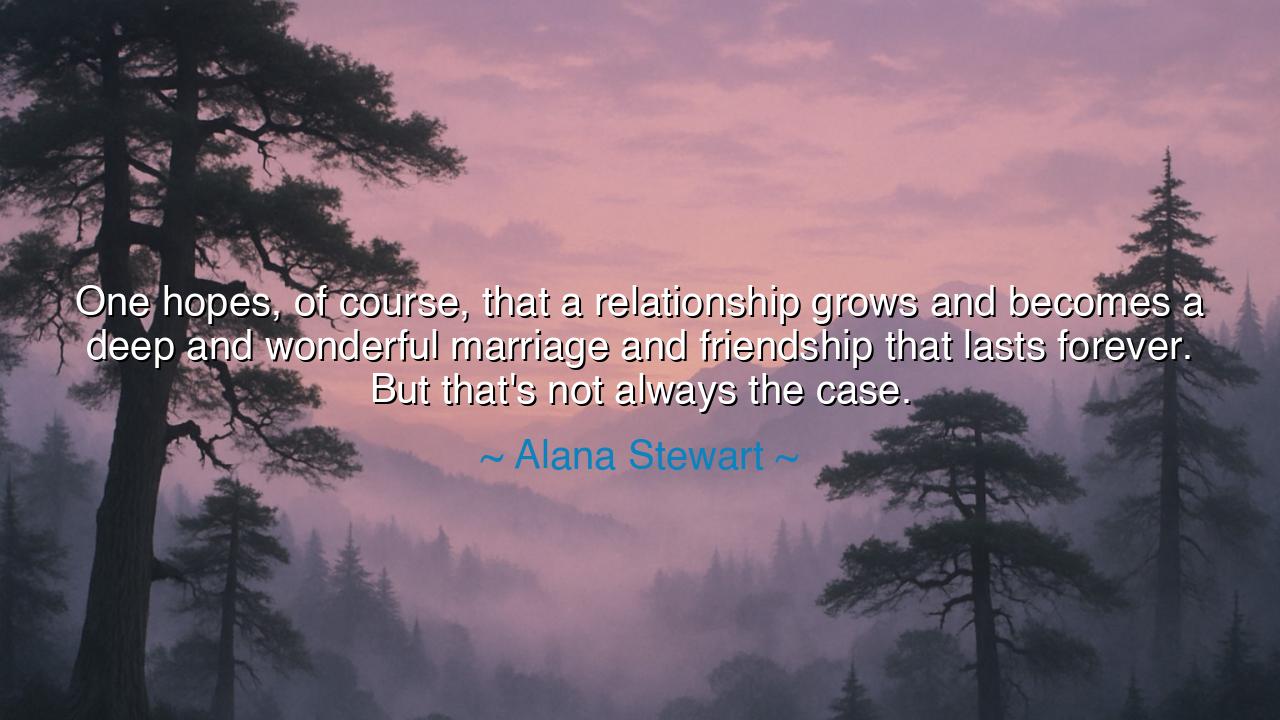
One hopes, of course, that a relationship grows and becomes a
One hopes, of course, that a relationship grows and becomes a deep and wonderful marriage and friendship that lasts forever. But that's not always the case.






"One hopes, of course, that a relationship grows and becomes a deep and wonderful marriage and friendship that lasts forever. But that's not always the case." These words spoken by Alana Stewart resonate with a wisdom born from experience and reflection. She speaks of the ideal—the dream—that a relationship will evolve into something eternal, something beautiful that endures all the trials of life. Yet, she reminds us that this dream is not always realized, and in this truth, we find the complex and sometimes sorrowful nature of human connections. Love, friendship, and marriage—these bonds, though deeply desired, are not immune to the forces of time, change, and circumstance.
In the ancient world, the bond of marriage was seen not just as a union of two souls, but as a reflection of the gods' will. The great philosopher Plato spoke of the ideal relationship in his dialogues, presenting love as a divine pursuit—a desire to find one's other half, to create a union that transcends the mortal realm. Yet even in his writings, Plato acknowledged the fragility of human connection. Socrates, his teacher, often warned that the greatest of loves could be tainted by greed, selfishness, or the limitations of human nature. The pursuit of eternal love was a noble one, but it was not guaranteed, for the world was filled with distractions, struggles, and the inevitable passage of time.
The Romans, too, understood this truth. Their gods—Venus and Mars, the deities of love and war—were not only revered for their beauty and strength, but also for their complicated and at times tumultuous relationships. Venus, the goddess of love, was both a symbol of passion and a reminder of the impermanence of desire. Her relationship with Mars, the god of war, was one marked by intensity, but it was not without strife. The stories of these gods were not just tales of beauty and harmony, but also of conflict, betrayal, and separation—illustrating that even in the most divine of unions, the promise of eternal love is fraught with difficulty and uncertainty.
In the history of royalty, we find numerous examples of relationships that were once pure and full of promise, only to be shattered by forces beyond the control of the individuals involved. Take, for example, the marriage of Henry VIII and Catherine of Aragon. Their love, once a union based on shared devotion and political alliance, turned into one of the most infamous ruptures in history. Catherine, a woman of grace and dignity, stood by her husband for many years, but despite her loyalty and devotion, their relationship deteriorated as Henry sought to secure his lineage through a new marriage. Here, too, we see the tragic truth of Stewart’s words: not every relationship, no matter how deeply rooted in hope, will grow into a lasting and harmonious union.
Thus, the lesson of Alana Stewart’s reflection is not one of despair, but of realism. Love, marriage, and friendship are indeed the highest of human aspirations, but they are also fragile, shaped by the whims of fate, personal growth, and the vicissitudes of life. To hope for a relationship that endures forever is natural, but to believe it without understanding the inherent challenges is to invite disappointment. Stewart teaches us that while we must strive to cultivate deep and enduring bonds, we must also recognize that relationships are not always destined to be forever, no matter how much we wish them to be.
In our own lives, we must seek to build relationships with intention and care, but we must also practice acceptance and letting go when the time comes. It is in accepting impermanence that we find the ability to cherish each moment for what it is, rather than clinging to an idealized future that may never come to pass. Friendships and marriages should be nurtured with love, honesty, and communication, but we must also remain open to the reality that some relationships will change, and others may dissolve entirely.
The wisdom of the ancients calls us not to idealize perfection in relationships, but to find meaning in the connections we make, regardless of how long they last. Let us, then, walk forward with grace and courage in our relationships, ever mindful of their fragility. As we do so, we will learn not only to cherish those we love but to accept the ebb and flow of life, and the inevitable changes that time brings. Let us embrace the impermanence of all things, and in doing so, find beauty in the transient nature of love and friendship.






AAdministratorAdministrator
Welcome, honored guests. Please leave a comment, we will respond soon